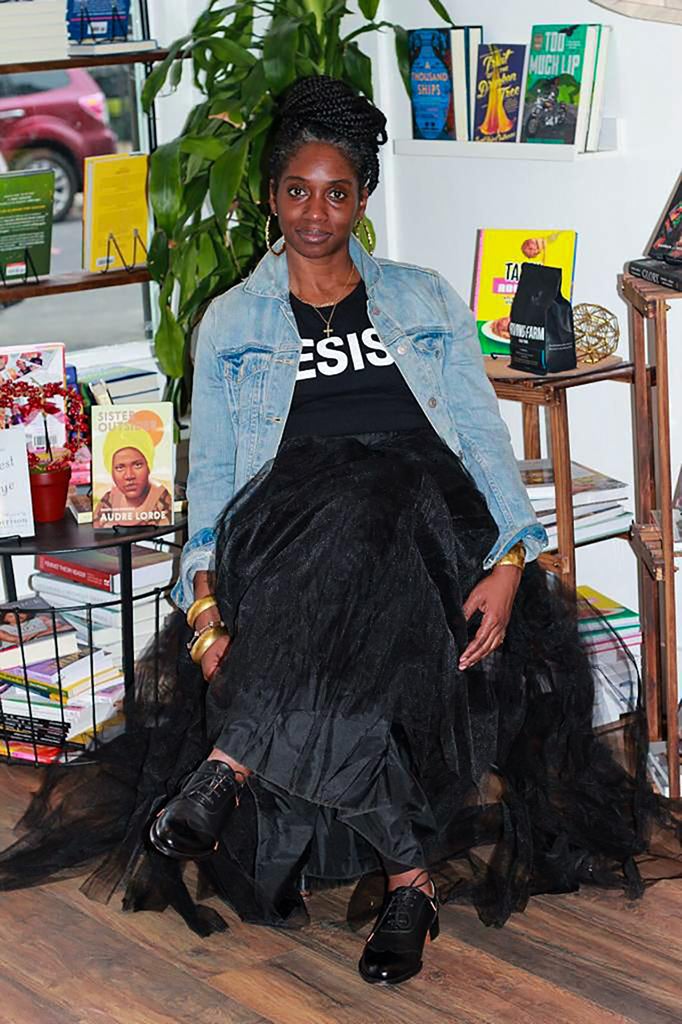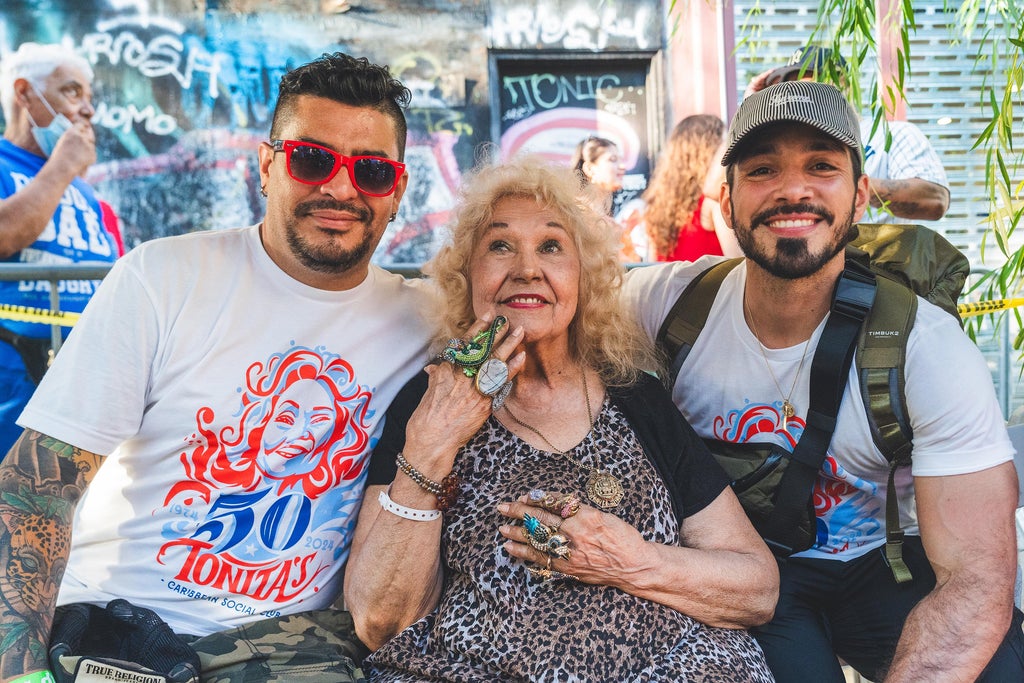New York Thrives on Latine Culture — But Gentrification Is Pushing Our Shops Out

On the evening of Saturday, May 17, Puerto Rican-owned Buddies Coffee in Williamsburg, Brooklyn closed its doors for good. The closure came three months after co-owner Rachel Nieves posted a TikTok revealing that her landlord planned to raise rent and open another cafe next door. The post generated an outpouring of support; soon, Buddies had lines out the door, an endorsement from Joe Jonas, and an appearance from Nieves on the Jennifer Hudson Show. Yet it wasn’t enough to save this small business from the perils of gentrification.
Buddies’ story echoes the struggles faced by Latine-owned businesses all over New York City. “We as Latines are facing serious challenges today, many of them created by those in power,” Giovanni Gonzalez, founder of the Latine empowerment nonprofit La Gesta, tells Refinery29 Somos. “They want to hurt our pride and downplay our presence because our light is inevitable and undeniable.”
Gonzalez works closely with Toñita’s, also known as the Caribbean Social Club, the last remaining social club in the historically Puerto Rican neighborhood of Los Sures, South Williamsburg. In 1974, María Antonia Cay — better known as Toñita — opened the space as a refuge for recently-arrived Puerto Ricans. Since then, it’s become an institution among Latines of all backgrounds and remains a homebase for mutual aid efforts, with Toñita cooking for the unhoused population in Los Sures once a week. But as the neighborhood’s demographics change, it’s become increasingly difficult to stay afloat — even as the club counts Bad Bunny among its regulars.
“They want to hurt our pride and downplay our presence because our light is inevitable and undeniable.”
Giovanni Gonzalez
“If our businesses were in a fully Latine community, we would not be struggling,” Kalima DeSuze, MSW, the owner and founder of Cafe Con Libros in Crown Heights, Brooklyn, tells Somos. “Because of the ways our communities are shifting and changing, you could be in a community and somebody could open up the same exact business, right next door. You could be doing the same thing that they’re doing, but their business, depending on their race and ethnicity, automatically gets more credibility.”

According to a May 2024 report from the New York City Economic Development Corporation, new businesses are opening in North Brooklyn faster than any other area of the five boroughs. Toñita has called North Brooklyn home for 51 years. She’s been offered $9 million to give up her Caribbean Social Club, and despite costs reaching an all-time high, Gonzalez says she’s standing her ground.
“It may look like her business is at risk, it being the last social club remaining in a gentrified Williamsburg,” he says. “[Toñita] brushes this off like lint on her shoulder, as if the weight of history she carries makes her immune to pressure. This isn’t just a bar — it’s a living altar of resilience, culture, and community. No amount of money or intimidation can compete with that kind of purpose.”
Gentrification has required Latine businesses to become more active on social media, the predominant business discovery platform for New York City transplants. Marketing-savvy Latines have found creative ways to service the businesses they see as vital to their communities. Paulina Montiel is the co-founder of Migo Events, a New York City-based organization that hosted the city’s first-ever Mexican Restaurant Week in 2024, which provided social media-driven promotion to Mexican restaurants across the boroughs. “When we partner with local businesses, we try to teach them [about] social media,” she tells Somos. “I’ll go to cafes like Xoco-latte Bushwick, and I always tag them and tell people about them. Even if it means one person comes, two people come, they usually come back.”
“Because of the ways our communities are shifting and changing, you could be in a community and somebody could open up the same exact business, right next door. You could be doing the same thing that they’re doing, but their business, depending on their race and ethnicity, automatically gets more credibility.”
Kalima DeSuze
DeSuze notes that when people of marginalized identities open a business, they’re expected to go above and beyond in ways their white, non-Latine counterparts are not. “I can’t just be a bookstore,” she says. “I have to be fighting to close the income gap, I need to try to close the reading gap, I need to make sure that people learn how to speak English and know their rights. … What then happens for businesses of color is that we take on the responsibility of the world, and then we end up getting burnt out.”

Toñita’s and Cafe Con Libros demonstrate the magic that can happen when a Latine business defies those expectations. Instead of attempting to solve every problem faced by Latines, Toñita and DeSuze focus on the professions they know and love. This allows them to create more genuine connections with regulars and new visitors alike. “Spaces like these are what true community growth is all about, especially in cities where money and selfishness rule,” says Gonzalez. “Businesses like Toñita’s are worth preserving and fighting for because they remind us what it means to be human.”
It can be easy for Latine businesses to fall into the trap of trendy, Instagram-friendly renovations, especially in the cutthroat New York City market. It might attract new customers in the short term, but Montiel sees value in maintaining a business’s original structure and design, whether it’s photos of la patria on the walls or those plastic tablecloths. “That’s what makes us feel like we’re back at home,” she says.

“Investing in us is going to have the same outcome as investing in other cultures.”
Paulina Montiel
Spending money at these businesses is great, but it’s not the only way to support. “Even if someone leaves us a Google review, do you know how big that is? That’s huge for us, huge for any business,” DeSuze says. She also recommends spreading the word about events hosted at your favorite spots, like the second annual Toñita Fest on Sunday, June 22. Gonzalez calls the block party-style event “an annual celebration meant to keep spreading the word, and help a small club in the heart of Williamsburg become bigger than life.” He’s currently raising money to cover its packed itinerary of cultural programming.
Montiel says Migo Events will continue to show up for New York City’s Latine businesses through its upcoming lineup of events. “That’s the goal, I think, of preserving these businesses: being yourself, pushing yourself into white spaces or spaces that other cultures have broken into, and showing that we have the same capabilities,” she explains. “Investing in us is going to have the same outcome as investing in other cultures.”
Like what you see? How about some more R29 goodness, right here?



:max_bytes(150000):strip_icc()/rs-roundup-best-last-chance-deals-tout-a154aa22c50a4cb4ad537efa63ee43c5.jpg?w=390&resize=390,220&ssl=1)
:max_bytes(150000):strip_icc()/fan-877cff0fc3204bbb8d845b0a306bcc87.jpg?w=390&resize=390,220&ssl=1)
:max_bytes(150000):strip_icc()/rs-15-amazon-gadgets-under-dollar15-that-are-so-useful-theyve-been-bought-over-5000-times-in-the-last-month-tout-8e41cab3c8274aa0867cbec6923f9375.jpg?w=390&resize=390,220&ssl=1)
:max_bytes(150000):strip_icc()/Messy-Girl-Aesthetics-GettyImages-1336705144-dae65a2f018a4776b0b0bb765dd95b33.jpg?w=390&resize=390,220&ssl=1)